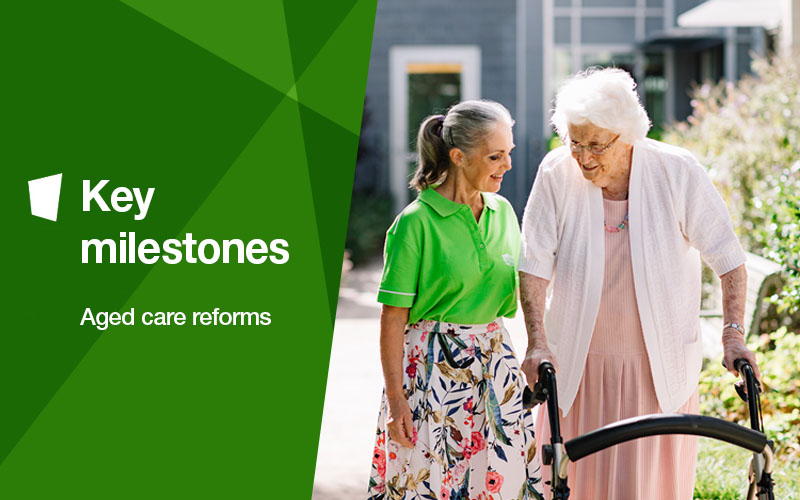Aged care reforms key milestones

Updated 13 Dec 2024
On 1 July 2025, the new Aged Care Act will come into effect. The Act focuses on creating a sustainable, quality-driven aged care system to address both immediate needs and long-term challenges. Its impact will largely depend on how these changes are integrated into everyday care and support for Australia’s ageing population.
As part of this transition, several key milestones have shaped the pathway to reform. Below, we outline the most significant steps leading up to these changes.
To learn more about the reform, read Aged care reforms: what you need to know (full article).
12 December 2024
The Governmnet announces a phased introduction of price caps for the new Support at Home Program
From 1 July 2025, providers will continue to set their own prices, as in the current Home Care Packages Program. Discussions between providers and participants are expected during this transion year. From 1 July 2026, the Government-set price caps will come into effect. Read more here.
9 December 2024
The Single Assessment System replaces current assessments
The Single Assessment System workforce will bring together and replace the Regional Assessment Service (RAS); the Aged Care Assessment Teams (ACATs) and independent Australian National Aged Care Classification (AN-ACC) assessors. This will provide a single assessment pathway for older people so they don’t have to change assessment providers as their needs change. There will be no changes to aged care eligibility requirements or in-hospital assessments. For First Nations assessment organisations, this will ensure the process is culturally safe, trauma informed and better connects Aboriginal and Torres Strait Islander older people with appropriate services.
Read more on the government's website. You can also refer to the fact sheet.
25 November 2024
Aged Care Bill passes Parliament
This means the new Aged Care Act will start from 1 July 2025. The Department of Health and Aged Care continues to consult on the Aged Care Rules, working closely with aged care providers and workers to allow for a smooth transition from 1 July 2025.
19 November 2024
Cap on cleaning and gardening is removed
The Government scrapes the controversial cap on cleaning and gardening for recipients of Support at Home services for eligible participants. The cap limited cleaning services to a 52-hour per year, and gardening to 18-hour per year to all participants. The cap was aimed to redirect resources towards clinical services, such as nursing and allied health, to ensure these were universally accessible without co-contribution costs. However, critics argued that the caps would have unintended and harmful consequences, making it difficult for many elderly Australians to maintain safe, liveable homes.
18 November 2024
The Aged Care Transition Taskforce is announced
The taskforce will work to identify and address implementation issues and provide expert advice to the Minister and the Department of Health and Aged Care.
1 July 2024
Single Assessment Tool is implemented
The Single Assessment Tool is implemented in preparation for the new Single Assessment System (replacing ACAT and RAS assessments). Currently, there are different assessment pathways. As a result, assessments are not consistent, and older people are often moved between assessment organisations as their needs change. The new system will provide a single assessment pathway that can quickly adapt to changing needs, without having to change assessment providers.
12 March 2024
Aged Care Taskforce final report
The report outlines 23 recommendations. Together with the Final Report of the Royal Commission into Aged Care Quality and Safety, the Aged Care Taskforce final report shaped many of the proposed changes, such as increased funding, a stronger focus on person-centred care, and a simplified system to improve access and equity in aged care service. To learn more, view the final report on the Government's website and the Government's response.
May 2023
The Aged Care Taskforce is created
The taskforce was created to address issues identified in the Royal Commission into Aged Care Quality and Safety. The Aged Care Taskforce was formed to:
- Develop funding strategies to support reforms recommended by the Royal Commission.
- Create a fair and equitable aged care system for all Australians, ensuring that funding aligns with the level and type of care required.
- Build on existing initiatives, including reforms in governance, transparency, and care standards.
March 2021
The Royal Commission's final report
The final Report from the Royal Commission into Aged Care Quality and Safety was delivered in March 2021, titled Care, Dignity and Respect. It made 148 recommendations to reform the aged care system, calling for significant changes in funding, governance, and care delivery.
- Key Findings: chronic underfunding (workforce shortages, lack of transparency, and inadequate quality assurance mechanisms), elder abuse (physical, emotional and financial), inadequate standards (poor food quality, inadequate clinical care, and insufficient support for dementia patients and those with diverse needs).
- Recommendations: create a new Aged Care Act to replace the 1997 Act, increased funding for aged care services to meet growing demands, workforce reform (higher wages, mandatory training, and stronger regulations for staff), stronger oversight with the establishment of an independent body to oversee quality and safety, and a person-centred care with greater focus on individual needs, especially for those living with dementia.
October 2018
The Royal Commission into Aged Care Quality and Safety is created
The Royal Commission was established in October 2018. It was initiated due to widespread concerns about substandard care, neglect, and abuse in Australia's aged care system.
As the Aged Care Reform progresses through key legislative and structural changes, the upcoming years will be pivotal in determining the effectiveness of these reforms. With the introduction of the Aged Care Act and the rollout of the Support at Home program, the focus is on building a sustainable, quality-driven aged care system that addresses both immediate needs and long-term challenges.
These milestones signal a commitment to reform, but the true impact will be seen in how these changes are integrated into everyday care and support for Australia’s aging population.
